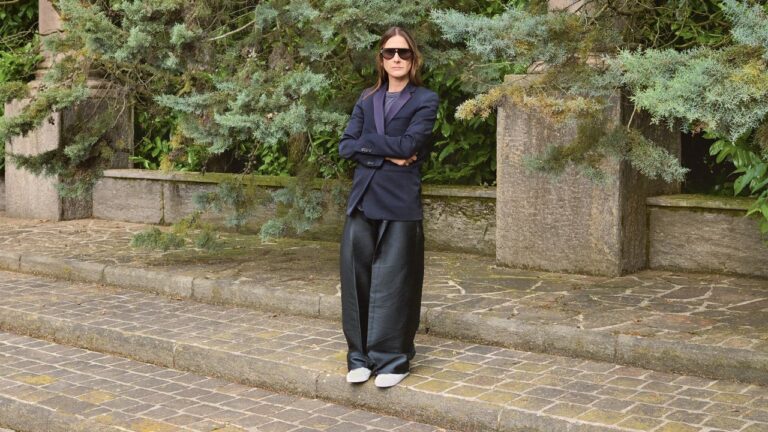We got a peek of Trotter’s new work at this year’s Cannes Film Festival when Julianne Moore, a longtime friend of the house, premiered Trotter’s first design for Bottega Veneta: a black strapless gown with a tassel detail that embodied a refined, minimalist elegance. (Vicky Krieps, meanwhile, wore Trotter’s backless intrecciato, or woven leather, top over a pair of wide white trousers.) “Dressing Vicky and Julianne was a conversation – woman to woman, creative to creative,” Trotter says. “These looks reflect and honour who they are.”
Woven leather has, of course, been part of Italy’s artisanal heritage forever, especially in the hills around Florence, but Bottega Veneta’s breakthrough was to tilt the weave on a diagonal – an elegant shift that softened the bags’ structure and gave them a distinctive, lived-in grace. Trotter’s mission is to broaden this history so that the bags mould to the body and “feel like an extension of the person”, she says.
Trotter, who is a great flaneur (or, more accurately, a cycleur, accustomed to biking all around Paris), finds much of her inspiration in observing other women throughout the city. “I see fashion less as an art than as something to be used to bring joy,” she says. “Great design should make you feel confident and help you live your best life.”
The roots of Trotter’s sensibility can be traced back to her childhood in Sunderland, a coastal town in the north of England that melds rough beauty and industrial austerity – a duality that shaped her creative outlook. “What people lacked in wealth,” she says, “they made up in heart, and warmth.” Her grandmother was a seamstress who introduced her to the world of fashion, with Trotter spending hours experimenting with her sewing machine. What began with making clothes for her dolls (“I didn’t have too many because I was a bit of a tomboy”) continued with curtains and tablecloths and, eventually, school uniforms. “I was the horror of my poor mother,” she says, laughing. “She would buy my uniform and within the first week I had completely chopped it apart. At the time, clothing was a form of escape and transformation. It still is.”
That instinctive urge toward rebellion stayed with her. After graduating from Northumbria University in Newcastle with a degree in fashion, she came of age in the vibrant London rave scene of the ’90s. “There was something magical about that world,” she recalls, reminiscing about finding her way into secret, nomadic parties. “It was a real period of self-expression and freedom,” she says. “Joy is the word that I would say. There was a feeling of discovery in the air – a culture unfiltered by social media, where everything felt fresh and urgent.”


